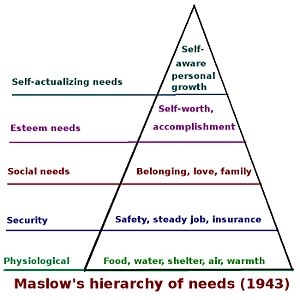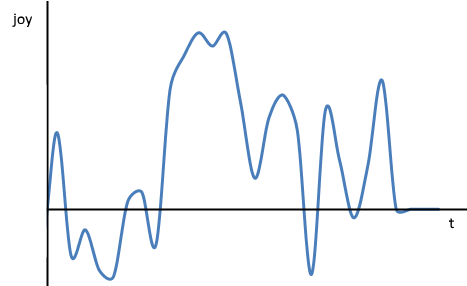Happiness and Meaning
abracad, · Categories: buddhism, self helpEvolution drives us towards survival and reproduction. That we exist, now, is a result of our ancestors being sufficiently good at survival and reproduction that we have a 4 billion year unbroken lineage to the origin of life. At some unknown point in that 4 billionn year journey we developed consciousness and (perhaps) agency. In some way we (what is we, or I, or 'self'?) became aware of our environment and aware of the choices open to us in negotiating it towards some end.
Evolution continually drives us towards the next nourishing meal and the next potential partner in order that our specific genetic pattern may survive in perpetuity, or long beyond our individual mortal body. It does this by driving us to seek positive emotions, that which 'feels' good, and to avoid negative emotion (what feels bad). But feelings are inevitably short-lived. It would not serve evolution if one tasty meal satisfied us for a lifetime.
Over countless aeons, civilization developed drives that seem to exceed the basics of evolution. We still seek the momentary hedonistic buzz of basic fulfillment. But its inevitable transience causes us to seek the more sustained satisfaction arising from meaningful purpose in life.
Say you win the lottery, you have more money than you could ever spend or even know how to spend. First comes the momentary buzz, that's a lot of meals, 'partners' etc. But 4bn years of evolution makes humans are resilient. We quickly grow used to our wealth. The realisation kicks in that it's due to pure chance, in no way reflecting personal worth.The buzz fades, back to a level of normal satisfaction similar to what existed before our 'good' fortune.
Most people in the developed world live in unimaginable comfort compared to our ancestors who lived on the plains of Africa. These people have guaranteed food and shelter. Even if for some reason they cannot provide for themselves most of the civilized world operates a welfare system that gives them at least sufficiency. Yet mental problems like anxiety, depression, stress are rife.
We'll always seek the momentary hedonistic buzz that's so deeply programmed within. But it isn't enough. Even the multi-millionaire that can satisfy these urges at a whim finds the buzz rapidly loses its intensity.
Hierarchy
Maslow's seminal paper 'A Theory of Human Motivation' suggests human needs form a hierarchy (the hierarchy of needs). This hierarchy consists of, from the bottom, physiological needs, safety needs, belongingness and love needs, esteem needs, and finally self actualization. Maslow suggests that we focus on the lowest un-fulfilled need until it is satisfied, we then move on the the next higher and so forth.

Meaning
From 'big bang' to the emergence of life to consciousness and humanity. Is all this mere accident of chance? Am "I" a passive observer of random, indifferent, meaningless 'fate'? Or is there some 'meaning', some reason for this/my existence?
Meaning implies reason. The finite reality of this experience being part of something unlimited.
But there lies a paradox. If reality is finite, it has no meaning. For whatever we and those that come after build-up, it will all eventually be destroyed to nothing. But if it is infinite, nothing any individual, group, race or species can ever do will ever amount to more than infinitesimal consequence, the tiniest drop in an endless ocean.
But what if the journey, or even very continued nature of the universe, was determined moment by moment by every single act of agency? That would be true meaning, and make human existence part of co-creation.
We can never know for sure in this incarnation if we really have agency or are part of some ultimate meaning (the two hypotheses are inextricably intertwined). But we can apply our reason to find the least-cost most-gain assumption.
If there is no meaning/agency, whatever we 'believe' or do is completely futile - no gain/loss. Nothing could ever be other than as it is.
But if there IS agency, even meaning, if we believe and embrace it there is unlimited potential gain, for real happiness and satisfaction. But if we're fatalistic, passive victims of falsely imagined 'fate', not only do we forgo potential satisfaction but also abdicate our role in shaping unfolding reality.
Meaningful, lasting, satisfaction comes from finding and pursuing purpose. In some way doing/creating something that will outlast the moment, will extend beyond the individual to impact greater reality.
Happiness is an internal state, a conscious choice. The psychiatrist Viktor Frankl said:
"Between stimulus and response there is space. In that space is our power to choose our response. In our response lies our growth and our freedom."
It is between stimulus (input from the outer world) and response (choice, action) that we interpret and react to the seemingly indifferent world.
Unless, as some religions claim, we've died and gone to paradise there will always be flaws in the world we perceive. Whether we try to improve those flaws or move to some less-flawed (more personally pleasing) situation, or allow the imperfections to cause stress, depression etc is a matter of choice. If it ain't working, change it. If you can't change it all, focus on what you can change or at least mitigate.
Acceptance
Buddha identified the cause of 'unsatisfactoriness' as attachment to what is and futile craving for what is desired but is not. But, everything is impermanent. That which is good now will inevitably cease.
Happiness is being able to appreciate the good of the moment in acceptance of its transience. You don't have to be perpetually obsessed with its cessation, just appreciate the moment.
Similarly lack of happiness is due to bemoaning what cannot be.
Don't stop having goals, goals = purpose. If you don't like your present reality, do something to make it better, whatever you can do, now.
The Purpose of Life
The Calculus of Happiness
Consider a graph of joy/sadness against time (lifespan). The rational fundamental goal of this life is to maximize the net positive area under the remaining curve before the inevitable neutrality of death. (What happens beyond death is un-knowable, ie whether there is any kind of existence and whether it's influenced by the choices and experiences of the preceding life. However, your belief on this may impact your joy-maximization strategy.)

However, this presents 2 difficulties. The level of joy at a given time is not a simple measure, but the net result of the many factors affecting someone as they progress through life. And life is inevitably uncertain. We don't know how long we'll live. Actuarial life expectancy is a long established discipline of the insurance industry, and can accurately estimate distributions of life expectancy across a population. But it says very little of certainty about how long a given individual will live.
Furthermore, we inevitably operate under uncertainty on the basis of imperfect information. However much we may reflect on a choice between A and B we cannot KNOW the resulting future of either.
We're always faced with the dilemma between pleasure today or potentially greater pleasure tomorrow. Eg going on a fun trip with friends now v. investing the money for the possibility of even more joy in the future.
It all comes down to some inner assessment of the relative gains and their probabilities, or, more likely, the legendary 'gut' feeling.
Finding Happiness
Happiness comes from:
- Having purposeful meaning, ie valid reason to be doing what you are doing, now.
- Authenticity. Knowing yourself and the reality you inhabit. Having meaningful goals based on this knowledge. The alignment of choice and action with those goals.
- Knowing the bounds of your influence. Focusing effort on where you can have most effect. Not banging your head against the proverbial brick wall.
- Maintaining a true perspective on life vicissitudes.
- Absence of stress, the discomfort of being in an unsatisfying situation.
- Hoping massively, but expecting nothing.

Leave a Reply